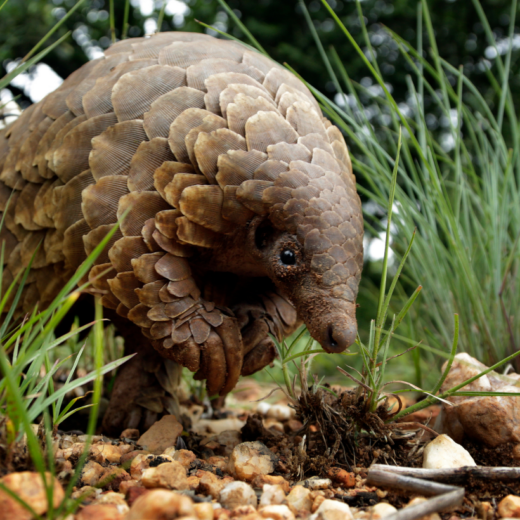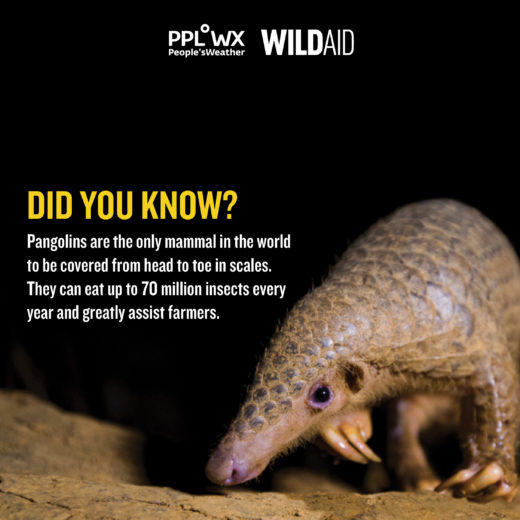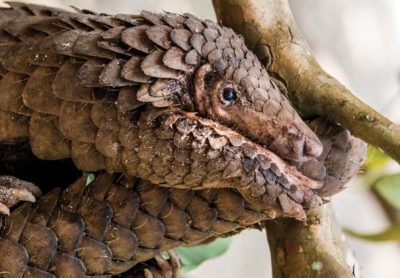
WILDAID
SAN FRANCISCO (September 21, 2016) — Pangolins, the small, reclusive mammals unique for their armor of overlapping scales, are being driven to near extinction by unsustainable poaching and need stronger international protections in order to survive, according to a new WildAid report and dramatic video of pangolin poaching and trafficking released Wednesday.
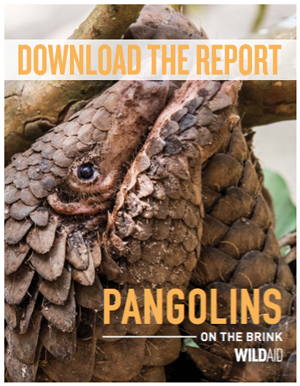

Pangolins are especially vulnerable to poaching because of their slow reproductive rate, sensitivity to capture-induced stress and instinct to curl into a ball when threatened, rather than try to escape. Because of their specialized diet, pangolins also are difficult to maintain in captivity, making commercial breeding a non-viable means of supply.
The elusive nature of pangolins has made it difficult to estimate how many still exist in the wild. However, hunters, traders and locals have reported drastic declines in sightings of Asian species across different parts of their range. Interviews with hunters in 2007 and 2011 suggest populations of the Sunda Pangolin in Peninsular Malaysia have fallen dramatically, with 95% of hunters recognizing severe declines, especially since 1990, when the commercial trade began to escalate. The rarity of sightings in the wild, coupled with the massive volume of scales and carcasses seen in trade over the past decade, indicate that all eight species may be on the brink of extinction.
Demand for pangolin scales (used in Traditional Chinese Medicine) as well as pangolin meat, considered by some as a delicacy, is highest in China and Vietnam. Though there is no scientific evidence to support alleged curative properties of pangolin scales, a 2015 WildAid survey found that 70% of Chinese respondents believe pangolin products have medicinal value; scales are used to “cure” rheumatism, skin disorders and wound infections. In Vietnam, 64% of survey respondents said they had heard about the “curative” properties of pangolin scales.
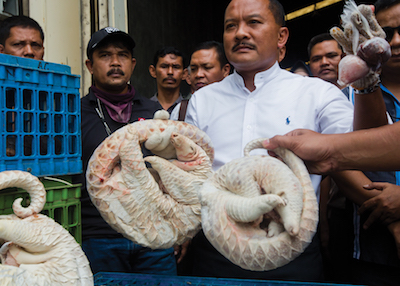

To protect pangolins, the new report calls for:
• A total ban on pangolin meat consumption in China and Vietnam
• Removal of pangolin products from the Pharmacopoeia of the People’s Republic of China
• Specialized law enforcement training
WildAid is working in both nations with a coalition of Asian celebrities, government representatives, diplomats, business leaders and media partners who speak out against the pangolin trade and urge consumers never to buy pangolin products. The campaigns use proven strategies that have helped to reduce consumer demand for shark fin and elephant ivory.
“Illegal trade in pangolin scales and meat has already endangered populations in Asia and increasingly threatens the African species, too,” said WildAid CEO Peter Knights. “While we work to reduce consumer demand for pangolin products in Vietnam and China, an Appendix I uplisting will make enforcement more effective and conservation a global priority.”
Coinciding with the report release is a new PSA from Vietnamese-American actress and WildAid ambassador Maggie Q, who traveled to Vietnam last year where she filmed the ad at a wildlife rescue center. “This endangered animal is largely overlooked, but in fact is the most-trafficked mammal in the world,” Maggie Q says in the new PSA, produced in Vietnamese and English. “Pangolins need our help before they all disappear.” (Click here to download/embed the PSA.)
In China, WildAid teamed up with The Nature Conservancy-China this past spring on the launch of a pangolin campaign starring model and actress Angelababy — one the nation’s biggest celebrities with over 60 million followers on Weibo, China’s Twitter-like social media network. The campaign features PSAs and billboards at Beijing Capital International Airport as well as other prominent locations.
Over the past several years, the number of seizures of pangolin scales — as well as whole pangolins, both live and frozen — has significantly increased. Seizures of products originating from African nations suggest Asian markets are now sourcing African species to meet demand. Evidence from government seizures of pangolin products indicates that trafficking follows some of the same routes from Africa to Asia as elephant ivory and rhino horn.
In June, 11.7 tonnes of pangolin scales in two shipments from Africa were seized in Hong Kong SAR, representing the biggest seizures to date.
Stay in touch and get the latest WildAid updates.
SIGN UP
